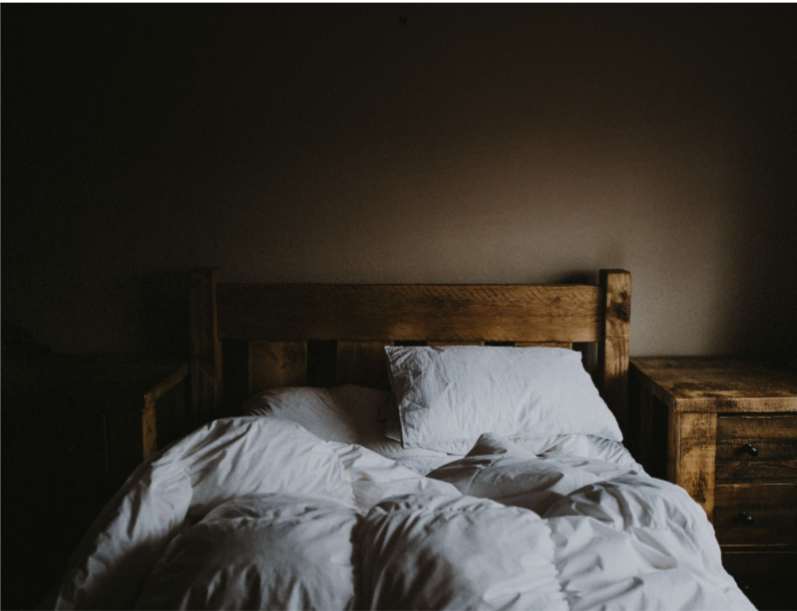Chronic Sleep Disorders: An In-Depth Look At Insomnia
décembre 20, 2019

Millions of people each year suffer from insomnia. But what exactly is this chronic sleep disorder? We take an in-depth look at the sleep disorder which is causing so many people to lose great quality sleep.
Chronic Insomnia: More Than Just Having Trouble Falling Asleep
We’ve all experienced a night or two of very little to no sleep at all. Maybe you couldn’t sleep the night before a big presentation or you just received some stressful news. At any stage of life, it is possible for us to experience a period of acute insomnia.
Yet, if the inability to fall asleep lasts for more than three nights a week over a long period of time, this is classified as chronic insomnia.
Many people think that chronic sleep disorders such as insomnia are purely not being able to fall asleep at night. From staying up late to watch a favourite Netflix show or scrolling through their phone for hours each evening.
Yet, it is so much more than this. In reality, this sleep disorder is a signifier of much more sinister psychological and physical health conditions.
What Is This Sleep Disorder?
Insomnia has become a public health issue all across Canada. According to studies, the number of adults reporting insomnia related symptoms or who meet the criteria for an insomnia disorder has risen dramatically in recent years.
This sleep disorder is defined as a repeated difficulty in initiating and prolonging the duration of sleep. Many people who suffer from insomnia may find themselves waking up often during the night and then unable to fall back asleep.
Chronic insomnia related symptoms include many of the following:
- Daytime fatigue
- Unrestorative sleep
- Hormone and mood imbalances
- Memory and concentration trouble
- Relying on medication or alcohol to fall asleep
While classified as a single sleep disorder and one of the most common in Canada, it is important to remember that it can also be a symptom of an underlying condition. That’s why if you are experiencing persistent sleeplessness, you need to consult with a doctor.
For those who do suffer from the frustration that comes with not achieving a night of good quality sleep, it can seem that there is no cure. Thankfully, this isn’t the case. There are many treatment options available that can teach people how to regain a healthy sleep schedule.
Causes of Insomnia: Why You Can’t Sleep Properly
The causes of insomnia vary. And often don’t consist of just one particular reason but rather a combination of many. For chronic insomnia, many links have been made between this disorder and other health concerns such as depression, chronic pain and sleep apnea.
In order to receive the correct form of treatment and regain great sleep quality, one of the following insomnia causes will need to be identified.
Anxiety & Stress
Anxiety and stress have long been linked to causing sleep problems. Having anxiety or high levels of stress hampers our sleep quality by causing us to lay awake at night for hours on end.
While everyone will experience periods of acute anxiety and sleepless nights from events such as losing a job or ill family members, if you are a chronic sufferer then it is not uncommon to also have a sleeping disorder.
There are many cases of people who suffer from both anxiety and insomnia known as bidirectional comorbidity. While symptoms are both independent of each other, they are also capable of exacerbating the other. So even though anxiety disorder and stress may be caused by other psychological factors, there is no denying the impact that it has on sleeping disorders such as insomnia.
Medical Conditions
There are many hormonal and physical conditions that have been known to be a cause of insomnia. Chronic pain conditions such as fibromyalgia, for example, have the ability to prevent individuals from falling asleep comfortably. Similarly, diseases such as Parkinson’s disease which interferes with brain and nerve signalling, make us wake up more often during the night disrupting our natural circadian rhythm.
Other medical conditions that can cause sleeping disorders include the following and many others:
- Menopause
- Depression
- Sinus allergies
- Gastrointestinal issues
- Restless leg syndrome
- Arthritis
Medication
It is also important to keep in mind that certain medications that you are taking could be the cause of your inability to sleep properly at night.
Many studies have found that medicine used to treat other conditions such as high blood pressure, thyroid disease and depression can also cause chronic insomnia. For example, beta-blockers that are used to treat hypertension are thought to inhibit melatonin secretion at night. When we have lower levels of melatonin at night, it is harder to regulate our sleeping patterns.
If you are experiencing a prolonged period of sleeplessness after starting a new medication, make sure that you consult with your physician and see if there is an alternative medication option available.
Other Sleep Disorders
Interestingly, it is possible for other sleep disorders to be the cause of chronic insomnia. A large majority of insomniacs may be aware that they have sleep breathing issues. Yet, they don’t often realize that this could be the reason behind their insomnia.
Obstructive sleep apnea (OSA), for example, has long been known to cause symptoms such as insomnia. This is mainly due to the fact that the physical functions that occur during a sleep apnea episode mean that disrupted sleep is inevitable.
While both of these conditions are classified as independent sleep disorders within themselves, there is also evidence to suggest that OSA increases the risk of causing co-morbid chronic insomnia.
Poor Daytime Habits
While it is important to determine whether a medical condition or your anxiety levels are the leading cause for your chronic sleep disorder, also look at your daytime habits.
Many don’t realize that our habits and behaviours throughout the day have a huge impact on sleep quality. Activities such as napping, eating sugary foods or exercising too late in the day all can make it harder for us to fall asleep.
Even the beverages that we consume can lead to sleeplessness. For example, drinking too much coffee during the day impacts our ability to unwind at the end of the day. Similarly, alcohol can have a negative impact on our sleep cycle over time.
How Our Body Reacts To Prolonged Periods Of Poor Sleep Quality
In order for us to get good quality sleep and to function properly, it is advised that most adults get up to eight hours of sleep per night. When our bodies have been deprived of sleep for an extended period of time, it causes devasting effects on how we function in our normal daily lives.
Prolonged periods of poor sleep quality cause us to experience chronic fatigue which impacts our productivity, energy levels and our ability to concentrate on everyday tasks. Yet, it also impacts how we function mentally.
Chronic sleep disorders have been known to alter our hormone levels causing intense mood swings and emotional instability. It can even lead to decreased memory retention and brain fog which has been linked with an increased risk of accidents and injuries happening such as car crashes.
Poor sleep quality also severely impacts our physical health and has been linked to conditions such as heart disease, hypertension, diabetes and weight gain.
Fight Chronic Sleep Disorders With A Better Sleep Environment
Chronic sleep disorders are treatable. The first step in getting your sleep quality back on track is to determine the cause for your lack of sleep.
In cases where you may be suffering for a medical condition such as OSA then it is important that you follow up with a doctor to receive the correct form of sleep apnea therapy for you. If anxiety and stress is the problem, consider talking to a family member or seeing if there are areas of your life that you can improve.
It’s also important to never underestimate how impactful our sleep environment can be on our sleep quality. Distractions such as light, noise and even too many objects in our bedrooms have been known to cause sleep disruptions. Interested in learning how to maximize your sleep environment? Read our tips for creating a better sleep environment.
Partager:
Laisser un commentaire
Les commentaires sont approuvés avant leur publication.



